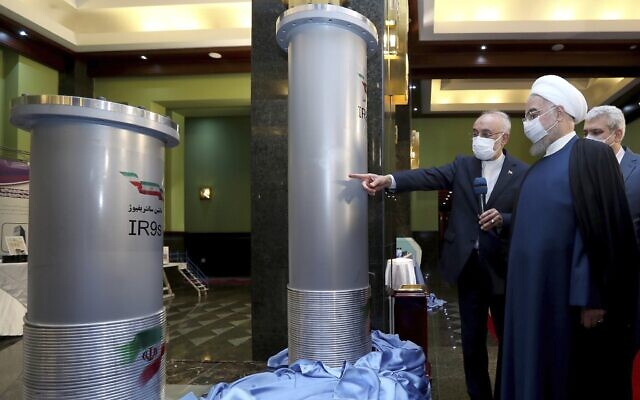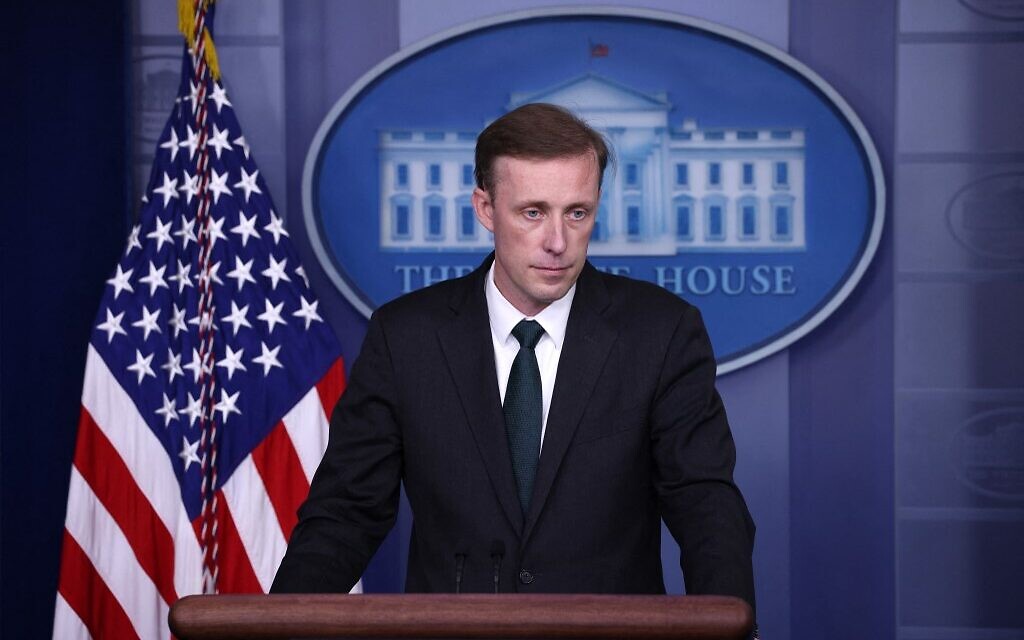Suggestion from Americans aimed at buying time for nuclear negotiations; Israeli official opposed move, fearing it would become permanent, report says

US National Security Adviser Jake Sullivan raised the prospect of an interim agreement with Iran to allow more time for nuclear negotiations, in talks with his Israeli counterpart, Eyal Hulata, according to a Wednesday report.
A pair of American sources said Sullivan and Hulata were just “brainstorming,” and that the proposal was suggested by an unspecified European ally of the US, the Axios news site reported.
The US sources said the proposal was for Iran to suspend a disallowed nuclear activity such as enriching uranium to 60 percent, in exchange for the US and allied countries releasing some frozen Iranian money, or issuing sanctions waivers on humanitarian goods.
An unnamed Israeli official cited in the report said Hulata told Sullivan he was against the idea and Israel’s concern was that any interim agreement could become permanent, allowing Iran to maintain its nuclear infrastructure and supply of uranium it has built up.
Hulata reiterated Israel’s opposition to the proposal to US Special Envoy for Iran Robert Malley, the report said.
In a separate call with Sullivan, Hulata said the US and its European allies must push to censure Iran at next week’s meeting of the UN’s nuclear watchdog, according to the report.

Israel and its allies have become increasingly concerned about Iran’s nuclear program in recent months, ahead of the resumption of talks on restoring the 2015 nuclear deal between Tehran and world powers.
The UN’s International Atomic Energy Agency (IAEA) said in its latest report on Wednesday that Iran has increased its stockpile of highly enriched uranium, defying commitments made under the nuclear deal.
Its estimate of Iran’s stockpile, as of November 6, was many times in excess of the limit laid down in the agreement with world powers, said the IAEA report. Such highly enriched uranium can be easily refined to make atomic weapons, which is why world powers have sought to contain Tehran’s nuclear program.
The Vienna-based agency told members that it is still not able to verify Iran’s exact stockpile of enriched uranium due to the limitations Tehran imposed on UN inspectors earlier this year.
The IAEA has been unable to access surveillance footage of Iranian nuclear sites or of online enrichment monitors and electronic seals since February. The agency’s chief, Rafael Mariano Grossi, told The Associated Press this month that the situation was like “flying in a heavily clouded sky.”
A Tuesday report by the Wall Street Journal said Iran has resumed producing parts for advanced centrifuges at a nuclear site allegedly once targeted by Israel.
Grossi will visit Tehran next Monday to discuss Iran’s nuclear program, the spokesman for Iran’s atomic agency said, as several key dates approach, including the resumption on November 29 of nuclear talks in Vienna, stalled since June.
Iranian President Ebrahim Raisi said Tuesday that Iran is “absolutely serious” about the nuclear talks, in a phone call with his Russian counterpart Vladimir Putin.
The Vienna talks will be attended by the remaining parties to the deal — Britain, China, France, Germany and Russia — while the US will participate in negotiations indirectly.
As reported by The Time of Israel
